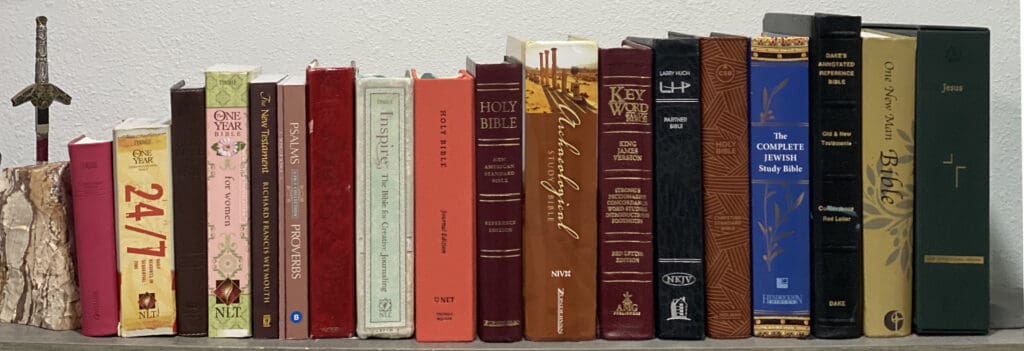Ronnie Trice, my pastor’s father, often said about reading the Word, “When you see ‘therefore,’ you need to see what it’s there for.”
I’ve never forgotten this instruction, but I must confess I sometimes forget to act on it. Little transition words like “so,” “then,” and “for” might seem insignificant, but they carry a lot of weight. And, sad to say, they’re all too easy to ignore.
Take the word “if.” It indicates conditions. That’s important when we’re talking about the promises of God. We get excited about God’s promises, and we should! But we too often overlook the conditions that come attached.
Let me give you a few examples.
John 15:7 (KJV)
Promise: “…ye shall ask what ye will, and it shall be done unto you.”
Condition: “If ye abide in me, and my words abide in you…”
2 Chronicles 7:14 (KJV)
Promise: “…will I hear from heaven, and will forgive their sin, and will heal their land.”
Condition: “If my people, which are called by my name, shall humble themselves, and pray, and seek my face, and turn from their wicked ways then…”
1 John 1:9 (KJV)
Promise: “… he is faithful and just to forgive us our sins, and to cleanse us from all unrighteousness.”
Condition: “If we confess our sins…”
These aren’t hidden messages. They’re right in front of us in black and white (or red and white, if it’s Jesus talking), but we miss them when we skim the words or focus only on the parts we want to see.
Recently, I was reading from the Renner Interpretive Version: James & Jude (RIV). In this version, Rick Renner takes the original Greek and brings out the meaning in a way that is both faithful to the text and alive with first century understanding. It made me appreciate transition words all over again.
Take a look at James 1:23. In the KJV it reads:
“For if any be a hearer of the word, and not a doer, he is like unto a man beholding his natural face in a glass.”
The word “for” is small, easy to skip over, but it’s crucial to the message. It ties everything back to what James has just finished saying and leads into what he has to say next. In the RIV, that same passage begins like this:
“You need to understand that if — as I’m certain is the case concerning what I’m about to say — anyone finds himself among those who merely show up to hear the Word but are not committed to putting it into practice…”
In other words, James was alerting his readers to the urgency of both what he had to say and how it all fit together.
What had he just said?
The end of verse 22 (still in the RIV) makes it crystal clear.
“These kinds of people make the grave miscalculation of thinking they’ve done all that is required by just showing up. Don’t trick yourselves into thinking that merely showing up and listening is all that’s required.”
Then come verses 23-24 where he talks about a man who looks in a mirror, sees things in his reflection that need to be fixed, then turns and walks away, forgetting all about what he’s seen. James is saying, “Don’t be that person!”
That’s a big “for.”
Of course, this truth holds up no matter which translation you choose. Transition words are like important signposts. They remind us of where the author has been and where he’s going. But here’s the thing: We’ve grown accustomed to reading the Bible in bits and pieces, chapter by chapter or even verse by verse, usually without thinking about how it was originally written.
Did you even know the Bible didn’t always have chapter and verse numbers?
It’s true. The Bible was originally written as continuous text. The chapter divisions we know today were first introduced in the 1200s, and verse numbering came even later. While they undeniably help us find things quickly, these divisions can also lead us to read verses in isolation, and this causes us to miss much of the flow and intent of the text.
Take Romans 8:1 for example.
“There is therefore now no condemnation to them which are in Christ Jesus, who walk not after the flesh, but after the Spirit.”
That “therefore” is a clue. It tells us to back up and see what led to this beautiful conclusion. When we start at Romans 7:21 and then read through Romans 8:4, we get the full context. In sharing his personal struggles with sin as well as the triumph we have through Christ Paul gives us a message that is only hinted at in Romans 8:1.
And then there’s Hebrews 12:1.
“Wherefore seeing we also are compassed about with so great a cloud of witnesses…”
Wherefore? Which witnesses? To answer these questions, you need to back up to the Hall of Fame of Faith found in Hebrews 11. Read about these heroes of the faith, see how they stood through everything in their lives, and you will be encouraged that you too can “run the race set before you.” And to truly grasp the full impact of Hebrews 12:1, I urge you to keep reading through 12:3. It’s all connected.
Experiencing the Bible is about more than reading a verse or two here and there. Don’t get me wrong: Cards and calendars that offer a scripture a day are good, but they are no substitute for truly diving into the Bible. If you want to let His words live in you as Jesus said in John 15:7, slow down, read in context, take it in fully, act on it, and watch it change you from the inside out.
That’s one reason I believe reading the Bible from cover to cover is one of the most powerful things you can do to grow in your relationship with God. When you follow the flow of Scripture, those little words — if, for, therefore, then, wherefore — become keys that unlock deeper understanding.
So next time you’re reading and come across one of them, pause.
Ask what it’s there for.
You might just discover it’s pointing to something life-changing.
Celebrating Jesus!
Tammy C
PS: If my references to the RIV intrigued you, you might want to check out my review of The Renner Interpretive Version: James & Jude.





